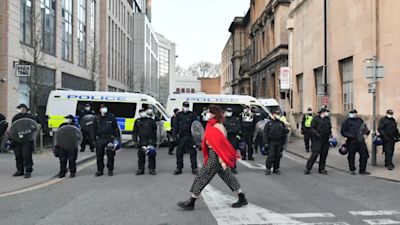Two more 'Kill the Bill' protests planned in Bristol this week

Two further 'Kill the Bill' protests are expected to take place in Bristol this week after three demonstrations in seven days.
People are expected to gather in Bristol later today (Tuesday 30 March) and then again on Saturday (4 April) to protest the Government’s Police, Crime, Sentencing and Courts Bill.
A 'Kill The Bill' demonstration in Bristol on Sunday 21 March saw thousands of people march through the streets of Bristol. But as the evening wore on, scenes turned violent.
Dozens of police officers were injured, fireworks were thrown and vehicles were damaged and set on fire during a riot outside Bridewell Police Station.
Bristol riot: Police release more images of people they want to identify
Police confirm officers did not suffer broken bones at Bristol protest
A second protest was held on College Green on Tuesday 23 March, where people set up an encampment. The event saw 14 people arrested as police dispersed the crowd.
A third demonstration on Friday 26 March saw 10 people arrested after police said eggs, bricks and glass bottles were thrown at officers.
Until around 10pm, the event was largely peaceful as protesters sat down in Bridewell Street in opposition to the proposed bill.
While a handful of demonstrators have been responsible for some of the violence, others are criticising Avon and Somerset Police officers for being too heavy-handed.
When are the next Bristol Kill The Bill protests taking place?
Tuesday 30 March: People are expected to gather on College Green from 6pm.
Saturday 4 April: A national day of action is planned with an event due to begin on College Green from 4pm.
Adverts being circulated on social media are reminding demonstrators to wear personal protective equipment (PPE) like face masks, and socially distance wherever possible.
Police respond after journalist ‘assaulted’ at Bristol protest
Boris Johnson condemns ‘disgraceful attacks’ on police at Bristol ‘Kill the Bill’ protest
Disruption to public transport
First Bus has confirmed there will be no services running from the city centre and Broadmead areas of Bristol until 5am on Wednesday (31 March).
Diversions will be in place for its buses.
Police say there are plans in place so these future demonstrations will not escalate in the same way others have.
Supt Mark Runacres, the Bristol commander for Avon and Somerset Police, said: “Following changes to Covid regulations, there is now an exemption to allow peaceful protests.
"However, this exemption only applies if the organisers take the required precautions to ensure people’s safety is not put at risk.
“We would encourage any protest organisers to engage with the police so we can help them ensure any protests are legally compliant, while also minimising the risk to the general public during this health emergency.
“We do understand the strength of opposition to the new legislation being debated in Parliament but we’re asking people to exercise their right to protest responsibly due to the clear health concerns."
He added: "Policing plans will be in place to manage the two protests should they go ahead and specially trained protest liaison officers will attend and look to work with those gathered."
What is 'Kill The Bill'?
People have been demonstrating against a proposed Police, Crime, Sentencing and Courts Bill, which would give police increased power to stop protests.
The Bill also makes a special new law to protect monuments and statues, in the wake of the toppling of the statue of Edward Colston, with the crime of damaging them punishable by up to ten years in prison.
Under new government proposals trespass would become a criminal offence - rather than being a civil matter - in order to tackle unauthorised encampments, giving police the power to seize vehicles and arrest people who refuse to move.
Those breaking the new law on trespass could be fined up to £2,500 and could face a prison sentence of up to three months, but concerns have been raised by both academics and organisations that the new law will disproportionately affect travellers and more widely those living on roadside camps.
Read more: